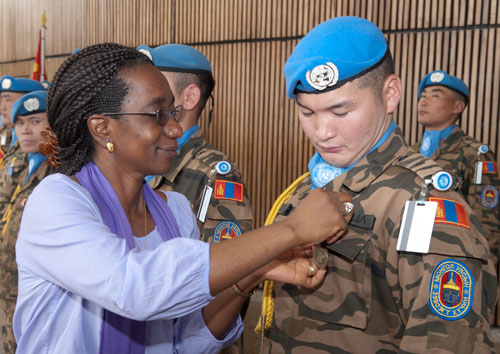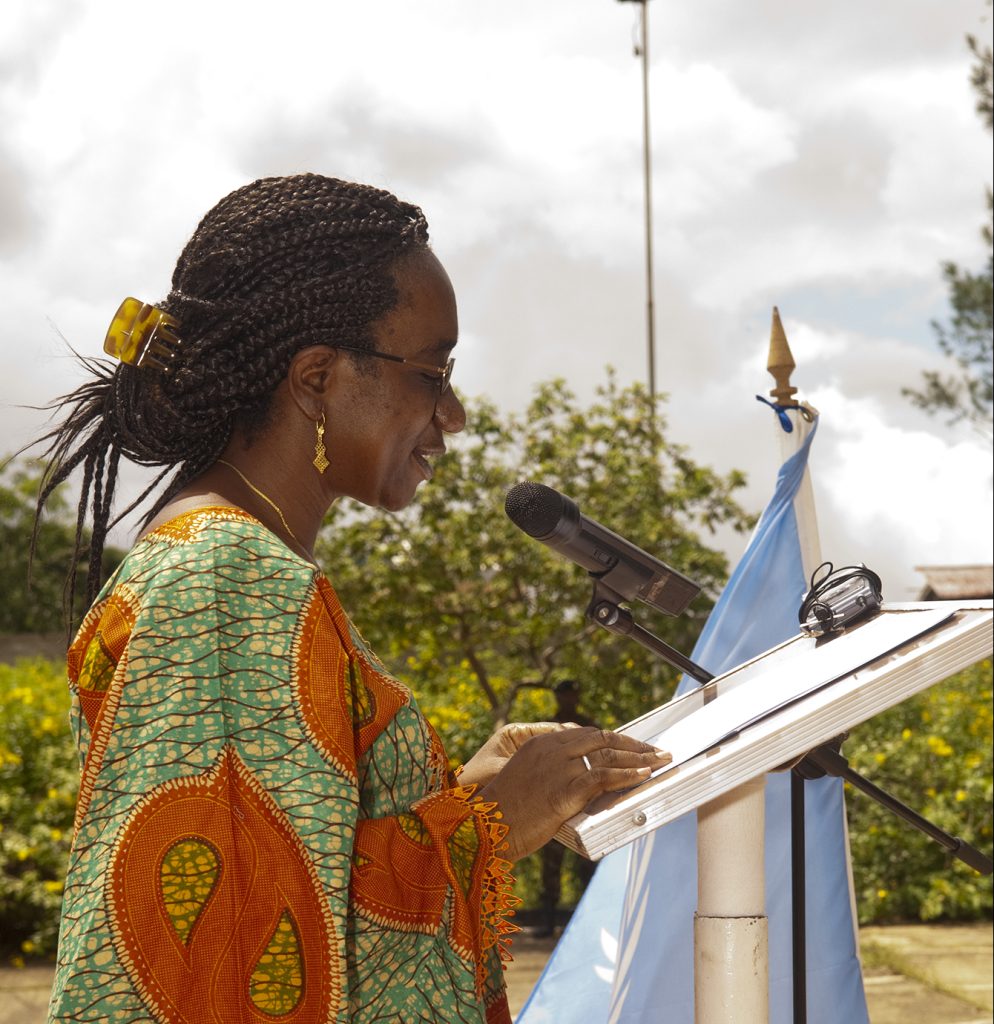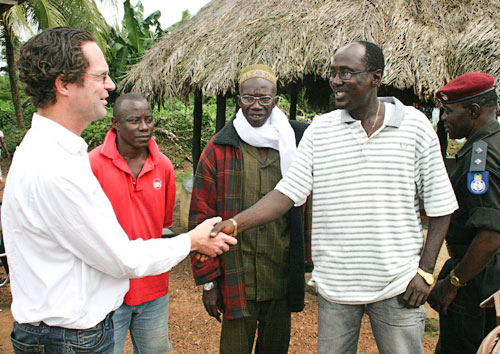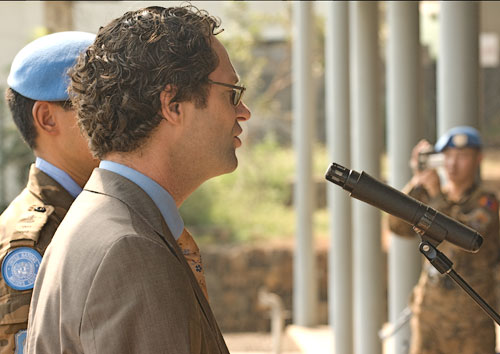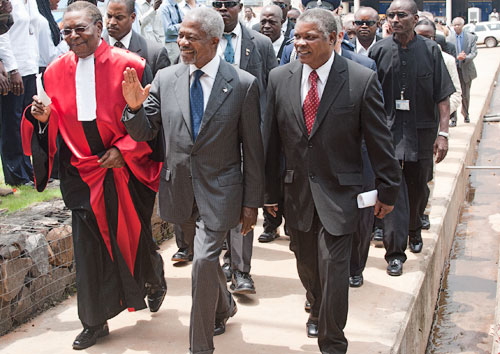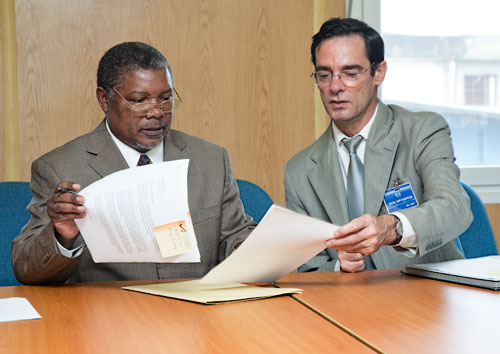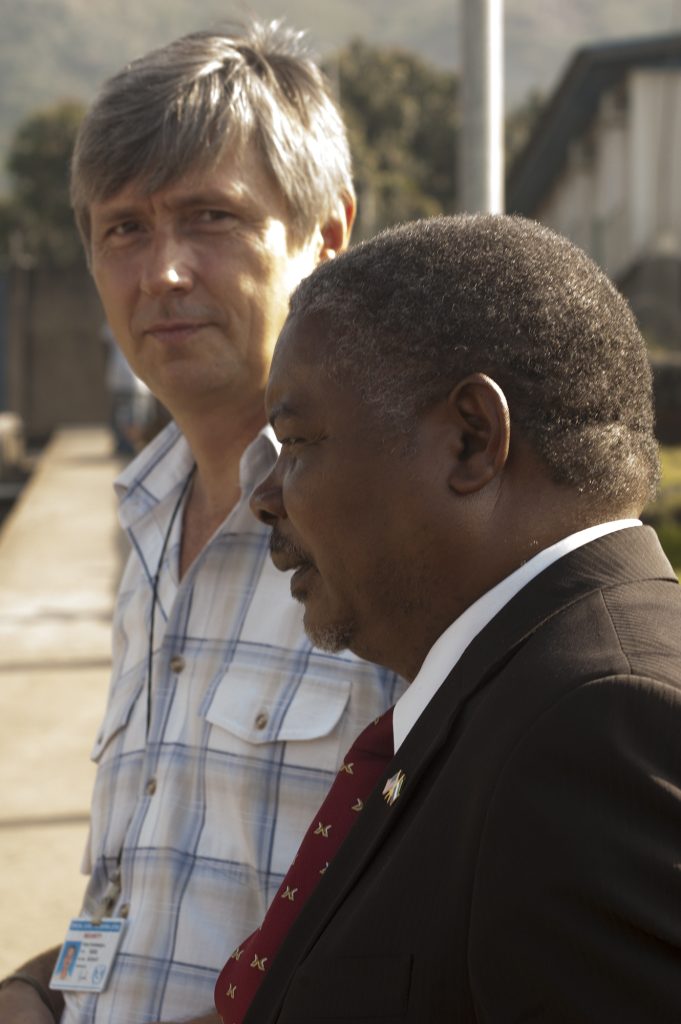The Registry of the Special Court was headed by the Registrar, who oversaw the administrative functions of the Special Court. The Registry included the Office of the Principal Defender, Administration, Court Management (which included Court Records, the Language and Stenography Unit and the Library), the Witness and Victims Section, Security, Detention, Communications and Information Technology, Outreach and Public Affairs, General Services, Facilities Management, Procurement, Personnel, Finance, and various other administrative offices.
The Registry was one of the three organs of the Court (the other two being Chambers and the Office of the Prosecutor), and its functions were outlined in the SCSL Agreement, the SCSL Statute, and the Rules of Procedure and Evidence. Pursuant to Rule 33(A) of the Rules,
“The Registrar shall assist the Chambers, the Plenary Meetings of the Special Court, the Judges and the Prosecutor, the Principal Defender and the Defence in the performance of their functions. Under the authority of the President, he shall be responsible for the administration and servicing of the Special Court and shall serve as its channel of communication.”
The Registrar was responsible for negotiating and concluding agreements with States and other organisations, and for promulgating official documents of the Court.The Registrar also took the lead in issues concerned with the Legacy of the Special Court and consideration of the residual issues which led to the creation of the RSCSL. The Registrar took an active part in fundraising, to secure the necessary funds to operate the Special Court.
Finally, the Registry was the official channel of communication of the Court, and the Outreach and Public Affairs section worked to provide information about the Court and the trials to the international and national media and to the people of Sierra Leone.
The Registrar headed the Registry, which was responsible for the administration and servicing of the Special Court and its channel of communication.
Registrars of the Special Court

Binta Mansaray was appointed Registrar of the Residual Special Court for Sierra Leone by the Secretary-General of the United Nations in September 2014. She had served as Acting Registrar of the Residual Special Court since its inception in January 2014. She previously served as Registrar of the Special Court for Sierra Leone, a post she held from February 2010 to December 2013, when the Special Court closed upon the successful completion of its mandate. From July 2007 to February 2010, she was Deputy Registrar, and while continuing to hold that post, she was appointed Acting Registrar in June 2009.
Ms. Mansaray first joined the Special Court in 2003 as Outreach Coordinator, during which time she designed the Court’s widely-acclaimed Grassroots Programme to keep the people of Sierra Leone, and later Liberia, informed about the Court and its trials. Prior to joining the Court, Ms. Mansaray was a human rights advocate for victims and women and adolescent ex-combatants of the Sierra Leone armed conflict, working with a number of organizations: She held the post of Protection Partner/Country Representative for the Women’s Commission for Refugee Women and Children in Sierra Leone; she worked with the Campaign for Good Governance, several civil society organizations, and she served as a consultant with the United Nations Mission in Sierra Leone (UNAMSIL).
As Registrar of the Residual Special Court, she initiated and oversaw the refurbishment, development and expansion of the Sierra Leone Peace Museum, which seeks to educate visitors, through artifacts and records, about Sierra Leone’s civil war and its aftermath, and about transitional justice. The Museum houses the public records of the Special Court for the benefit of Sierra Leoneans, visiting researchers and future generations. The Museum also has a Memorial Garden designed to promote contemplation of the tragedy of the country’s armed conflict, and in remembrance of those who lost their lives.
Ms. Mansaray is a graduate of the University of Sierra Leone. She received a Master’s degree in French from Fordham University in New York and a Master’s degree in Public Administration and Policy from American University in Washington, DC., and she obtained a certificate after successfully completing a one-year training on Women and Armed Conflict which was organized by ISIS-WICCE in Kampala in 1999 – 2000.
In April 2018, Ms. Mansaray was inducted by the American University into Pi Alpha Alpha, a Global Honour Society which recognizes outstanding scholarship in public administration and public affairs. The awards and recognition she has received include the following: In July 2022, Ms. Mansaray was the recipient of the first National Reconciliation Award for her dedicated contribution to transitional justice and human rights in Sierra Leone for over a decade. In 2014, she was made
Commander of the Order of the Rokel by then-President Ernest Bai Koroma for her work at the Special Court.
The Order of the Rokel is Sierra Leone’s highest civilian award. In 2006, she was named Princess Kavura by the then Paramount Chief of Moyamba District in Sierra Leone for
outstanding work as Outreach Coordinator in the district. In December 2005, she was an honoree of Global Rights in Washington, DC, in recognition of her remarkable role in promoting the rights of women during the war in Sierra Leone.

Herman von Hebel (the Netherlands), Deputy Registrar July 2006 to March 2007, Acting Registrar March 2007 to July 2007, Registrar July 2007 to June 2009.
Mr. von hebel became Deputy Registrar of the Court in July 2006. He was named Acting Registrar in March 2007 and on 20 July 2007 he was appointed Registrar by the United Nations Secretary-General.
Prior to joining the Special Court, from 1991 to 2000 he was a member of the Dutch Ministry of Foreign Affairs, working within the Department of the Legal Adviser and the Directorate of Legal Affairs. Between 1995 and 2000 he represented the Government of the Netherlands on the Preparatory Committee to set up the International Criminal Court.
In 1998 he chaired the Working Group on the Definition of War Crimes at the Rome Conference, and from 1999 to 2000 he chaired the Working Group on the Elements of Crimes. He joined the International Criminal Tribunal for Yugoslavia (ICTY) in 2001 as Senior Legal Officer.

Lovemore Munlo SC (Malawi), Interim Registrar October 2005 to January 2006, Registrar February 2006 to March 2007.
Mr. Munlo became Interim Registrar in October 2005. In February 2006 he was named Registrar by the Secretary-General of the United Nations, and held that post until March 2007.
Prior to joining the Special Court, he served as Deputy Registrar of the International Criminal Tribunal for Rwanda (ICTR) for four years.
From May 1994 to October 2001, he was in private legal practice as a partner in the law firm of Green Munlo & Co. From September 1993 to May 1994, Mr. Munlo served as Minister of Justice and Attorney-General of Malawi, and from January 1992 to September 1993 he served as Deputy Minister of External Affairs.
From 1990 to 1992, he was a Judge of the High Court and Supreme Court of Appeal; from 1987 to 1990 he served as Director of International Relations at the Ministry of Foreign Affairs, and from 1984 to 1987 as Director of Public Prosecutions in the Attorney-General’s Chamber.
Prior to 1984 he was a Senior State Advocate and State Advocate in the Attorney-General’s Chamber. Mr. Munlo received a Law Degree from the University of Malawi in 1976 and a Master’s Degree (LL.M) in Law from the London School of Economics and Political Science in 1989.

Robin Vincent (United Kingdom), Registrar April 2002 to October 2005.
Mr. Vincent was appointed the Special Court’s first Registrar in April 2002 by then-Secretary-General of the United Nations Kofi Annan.
He served as Registrar until October 2005.
Robin worked for nearly 40 years for the British courts, and briefly for the International Criminal Tribunal for Rwanda. He retired in 2001 as director of 32 court centres in northwest England.



